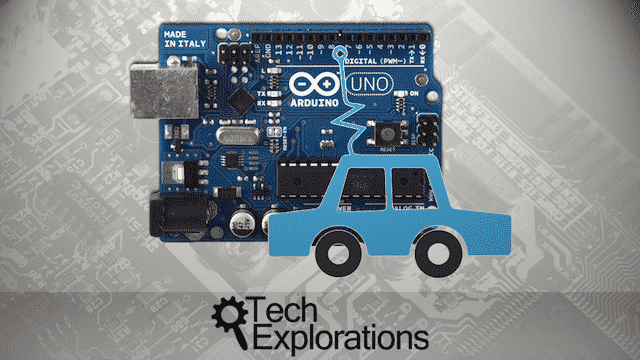I’m excited to announce our latest course: Arduino Car Projects!
As the name suggests, this course uses a remote-controlled car theme to teach three interrelated topics: DC motors, local and remote control, and sensors.
This course has a long history behind it. Back in 2015, I published my first Arduino Car course. It was titled “Arduino Fun: Make an Arduino remote controlled car”. In that course, I took a different approach: I found an old RC car, removed its electronics (threw away the RF controller), and added two Arduinos (one in the car and one in the controller). I used a Nintendo Wii joystick as the controller and a sensor to prevent crashes.
It was a fun project, giving one of my old RC toy cars a second life.

I learned a lot from creating that course and from my students. But not everyone has an old RC car available for retrofit.
The Nintendo Wii joystick had become hard to find, and I realized that the original course had a steep learning curve, both in the software and hardware domains. It required tools that must be used carefully (the hot glue gun and the power drill come to mind). Parts were also hard to find for most beginners (such as Li-Po batteries and connectors, a smart charger, switches, RF modules etc.), and the wiring was tedious.
It was time for an update on this course, and I decided to re-make it from the ground up.
The result of this work is Arduino Remote Controlled Car Projects.
This course is ideal for Arduino Step by Step Getting Started graduates or anyone with post-beginner working knowledge of Arduino wiring and programming.
This course teaches essential Arduino and programming skills through a series of fun mini-projects of increasing complexity. This is a pattern that I try to follow in my project courses.
The objective of the course is to help new Arduino Makers gain confidence and grow their skills, and it does this through a series of projects. All four projects (and perhaps more in the future) use parts from an educational Arduino kit from Sunfounder (so you don’t have to search the Internet for parts).
The car chassis I have used is designed to make hardware additions and removals easy. The Sunfoudner kit and its content’s quality (and pricing) are a huge advantage for this new course.
You will explore vehicle safety using an ultrasonic distance sensor in one project.
In another project, you will learn how to control the Arduino car with your smartphone.
You will learn how to program motors, take input from sensors to implement automation features, and explore various options to control your car.
The hardware I have used (motors, motor controller, radio modules, IR modules, Bluetooth BLE module etc.) is modern and supported by maintained libraries. This means everything you learn is easy to utilise in other projects.
All programming is done using the modern Arduino IDE 2, and if you wish, you can use the Arduino Web IDE.
Finally, as expected in all Tech Explorations courses, students will find all wiring schematics and programs in the course GitHub repository.
The course page contains the full course curriculum and sample lectures from Arduino Car Projects.
